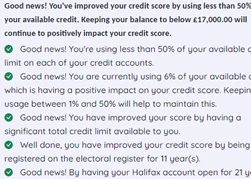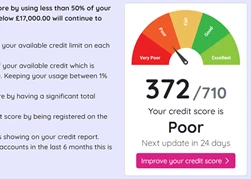Debt Management Plans and Your Credit Score

7th Mar 2025
A Debt Management Plan (DMP) can affect both your credit score and will show up on your credit file. If you’re paying less than the original agreed-upon amounts on your debts, this can show up on your credit report and may impact your ability to borrow in the future. It's not all bad though, and it can be a way of signalling you're serious about dealing with your debt.
If your finances have got to the stage where you are considering a DMP, your credit file may already be impacted if your level of debt has meant you have missed payments, or any of your accounts has gone into default. Always get advice from a financial advisor or a charity such as StepChange or Citizens Advice before entering into a DMP or other type of financial arrangement to get impartial advice on the implications of the agreement.
Is a Debt Management Plan Right for You
If you're unsure whether a DMP is the best way out of your debt situation, it’s important to try to get free, impartial advice before signing up to any deal. If you pay the full agreed amounts, your DMP won’t show on your credit file. Most people however sign up to a DMP because they cannot afford to pay the full amount, and if you make reduced payments through a DMP, it will be recorded on your credit file as "partial payments." Some creditors may also add a "DMP" or "arrangement to pay" marker to your account and this is obviously going to affect your credit rating in a negative direction.
How Long Does a DMP Stay on Your Credit File?
Any information related to your DMP, such as missed payments, defaults, or partial payments, will remain on your credit file for six years. These marks will be removed after six years, regardless of whether the debt is fully repaid. Making smaller payments through a DMP shows creditors that you are taking steps to address your financial issues, but a longer history of missed payments can have a greater negative impact on your credit score. Some lenders or landlords may require you to have a guarantor if they consider your credit history too risky.
Checking Your Credit File
The only way of working out what effect your decisions are having on your credit score is to get into the habit of monitoring your credit score regularly. This is easier than ever to do by using one of the many websites or apps on the market. You’ll be asked to create an account on most of the apps or sites but there is generally no charge for accessing your basic information.
There’s no need to be obsessive about checking every day or even every week. Improving your credit record will take some months, so check in with the app every month or six weeks and get an idea of how things are changing. Looking at your credit report also gives the opportunity to spot any mistakes, or any activity on your credit report which could potentially be fraudulent.
Don't risk missing
something important
Access a comprehensive credit report
that includes detailed data from TransUnion
View your credit score for only £1.95.
You can view it for 1 month, after which it will be £14.95 per month unless cancelled.
See How You Score

See How You Score
An Independent View Of Your Credit Score
Lenders typically use their own systems to calculate your Credit Score based on the information in your Credit Report, often checking with one or more Credit Reference Agencies. Your Credit Check Online Credit Score is derived from all the Credit Report information we gather from TransUnion, helping you understand how you might be assessed when applying for credit.

Understand What is Affecting Your Credit Score
Quickly see how the details in your Credit Report influence your Credit Check Online Credit Score, both positively and negatively. This clear overview helps you identify areas for improvement and better understand the factors that lenders consider when assessing your creditworthiness.
View your credit score for only £1.95.
You can view it for 1 month, after which it will be £14.95 per month unless cancelled.